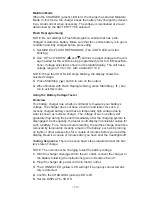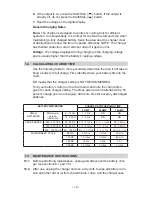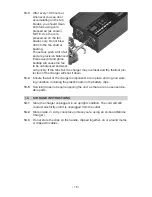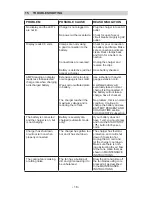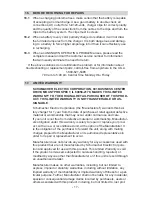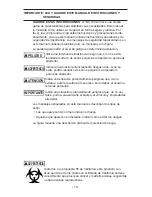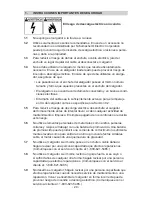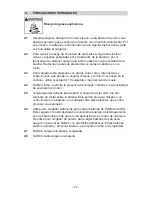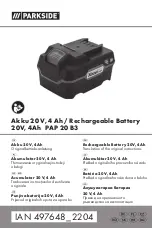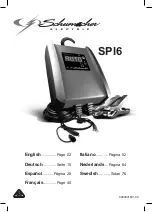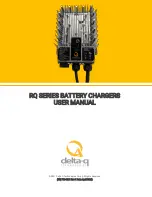
•
6
•
FOLLOW THESE STEPS WHEN BATTERY IS OUTSIDE VEHICLE.
7.
A spark near the battery may
cause a battery explosion. To
reduce the risk of a spark near
the battery:
Check the polarity of the battery posts. The POSITIVE (POS, P, +) battery
7.1
post usually has a larger diameter than the NEGATIVE (NEG, N, -) post.
Attach at least a 24-inch long 4 gauge (AWG) insulated battery cable to
7.2
the NEGATIVE (NEG, N, -) battery post.
Connect the POSITIVE (RED) charger clip to the POSITIVE (POS, P, +)
7.3
post of the battery.
Position yourself and the free end of the cable you previously attached to
7.4
the NEGATIVE (NEG, N, -) battery post as far away from the battery as
possible – then connect the NEGATIVE (BLACK) charger clip to the free
end of the cable.
Do not face the battery when making the final connection.
7.5
When disconnecting the charger, press the START/STOP (
7.6
) button to
turn the output off, disconnect the AC cord, remove the clip from the cable
attached to the negative battery terminal and then remove the clip from
the positive battery terminal.
A marine (boat) battery must be removed and charged on shore. To
7.7
charge it onboard requires equipment specially designed for marine use.
BATTERY CHARGING - AC CONNECTIONS
8.
Risk of electric shock or fire.
This battery charger, with auto line voltage select function, is for use on
8.1
nominal 120 volt and 240 volt circuits.
DANGER
– Never alter AC cord or plug provided – if it does not fit the
outlet, have proper outlet
installed by a qualified electrician. Improper
connection can result in a risk of an electric shock or fire.
Recommended minimum AWG size for extension cord:
8.2
100 feet long or less - use an 12 gauge extension cord.
•
Over 100 feet long - use a 8 gauge extension cord.
•
Summary of Contents for INC-700A
Page 2: ......


















